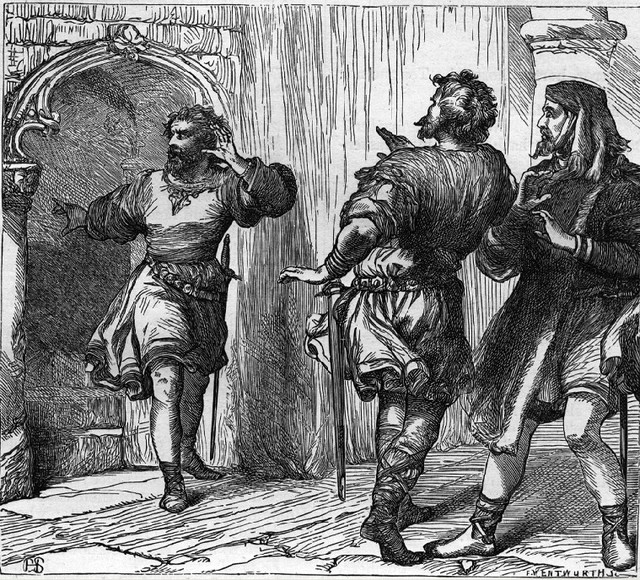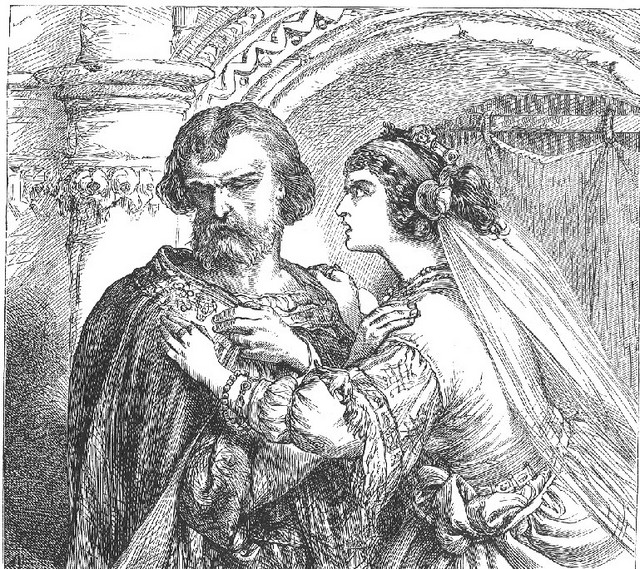(Question and Answers for King Canute.Questions taken from the workbook on Whispers of Immortality from Selina Publishers.Suitable for ICSE class X)
A. Read the extract given below an answer the questions that follow it.
" King Canute was _________ wild sea-shore".
i. What made king Canute weary-hearted?
King Canute thought about the futility of his victories. He had fought many wars and won them. Yet, he felt that he had not achieved much. His own sons wanted him dead.His achievement,suddenly, meant nothing to him. This made him sad and depressed.
ii. Where was he at the time? Who else were with him?
He was walking along the sea shore between the Chancellor and the Bishop. He was closely followed by various officials, military officers, personal attendants and others.
iii. What sort of people were these followers? Were they sincere people? Give reasons for your answer.
The people who were his followers were flatterers who wanted to be in the good books of the king. They were not sincere people. They followed him like a shadow. If the King frowned, they to had a sullen look on their faces. When he laughed, they echoed his laughter without knowing the actual reason for his mirth. They mimicked his action only to impress him.
iv.What was the king's state of mind at this time?
The King was sad and depressed wondering about his past activities like fighting plundering and killing. He was thinking whether his achievements, which were materially significant, amounted to anything at all. He felt that his entire life was wasted.
B. Read the extract given below an answer the questions that follow it.
"But that day a something ________ hold her tongue".
i. Who is being spoken about as his grace? What was his mood? What does yawned convey?
The reference that is being made is to the King. He looked distracted and worried. The very fact that he yawned when his favourite court singer sang conveyed that his mind was elsewhere.
ii.In what ways was the king's behaviour different from the usual?
Normally the king would enjoy when his favourite singers sang.He loved the delicacies that were served to him.However, on that particular day,he appeared to be distracted. He neither enjoyed his food nor did he enjoy the music.
iii. What did the attendants feel had vexed him?
The attendants thought that the king was displeased with the food that was served to him at dinner.
iv. How did the King react to this suggestion?
The irate king exclaimed in disgust that it was not the food, but his heart which was causing him discomfort.
V. What, does the King say, was the cause of his worry? What did the king bade the Queen?
The King says that the cause of his worry was his heart. He said that he wondered whether all his achievements were worth anything at all. His disenchantment with life was the cause of his worry.The king bade the queen not console him.
C. Read the extract given below an answer the questions that follow it.
"Leading on my fierce..... me all my kingdoms?"
i. What does the king want to convey through these lines:
'leading on my fierce companions, cried he, 'over storm and brine.'
I have fought and I have conquered! Where was glory to mine?
In these lines, the king recalls his glorious past and tries to convey that he was a king par-excellence. He had fought battles and conquered territories braving violent storms and rough seas.He says that no other king had achievements to match his.
ii. What does the courtiers' echoing the king's words tell us about them? What does the poet want to emphasise here?
The courtiers reaction to the king's words shows that they are not genuine. The poet wants to emphasise the hypocrisy that is prevalent in the society.
iii. What is the Kings tone in this stanza? What makes him feel this way?
The king speaks with great pride because he says that he has had a glorious past by conquering various kingdoms.He says that the glory achieved by him had seldom been achieved by anyone else.
iv. What does the say of his sons? Why does he mention them?
The King said that his sons are longing to see him cold and dead. He mentions them because he feels that his end is drawing closer and closer.He mentions them because the lack of affection from his sons was one of the reasons for his regret of his life.
D. Read the extract given below an answer the questions that follow it.
"Nay, I feel, replied the king...... live this fifty year".
i. What is the king replying to? What does he say?
King Canute thinks of his children and their attitude towards him which depresses him and makes him talk about his death which he feels was drawing closer.
ii. What do the courtiers say to this? Do they mean what they say? What tells us so?
The courtiers completely disagreed and assured the king that he was strong and healthy and that he would live another fifty years. The difficulty they have shedding tears to show their concern indicates that they are false.We can also say that they do not mean what they say because the Bishop said that King Canute could live for a thousand years - which is obviously untrue.
iii. What does the Bishop add to this exaggerated wish mentioned in the next few lines?
The Bishop chides the keeper for saying that the king would live for another fifty years when he would very well in for another thousand years. The Bishop cites the example of Jephthah, the Israeli general who stalled the sun and the moon by his prayer. If the king desired, his wish to live long would also be fulfilled.
iv.What does the poet want to convey through these flattering words?
The poet wants to convey that flattery leads to nowhere.
E. Read the extract one below an answer the questions that follow it.
"Did not once the...... were his sacred will."
i. Who is King Canute being compared to and in what respect? Explain the reference to the Jewish captain.
King Canute is being compared to the Jewish captain Jephthah who bid the sun and the moon to a standstill. The king's followers said that he too like Jephthah could command the sun and the moon.The reference to the Jewish captain is brought up here because the courtiers are trying to convey to the king that he too was all powerful like
Jephthah.
ii.What effect do these words have on Canute?
Encouraged by the flattery the king regains his self-esteem.
iii.How does the King react on being compared to the Jewish captain?
The King feels happy on being compared to the Jewish captain - who had the power to stop the sun and the moon in the heavens.

iv. What does the king feel encouraged to do? What happens then?
Once again the King feels powerful. In order to demonstrate his powers he orders the waves to recede. To his surprise, the sea roared and the waves rushed with all their forces towards the shore.
v. What does the action of the waves conveyed to Canute?
The King realises that God is the Master of the universe and man can never dream of becoming his equal.
iv.How does Canute change after this incident? And what instructions does he give his followers?
King Canute who was obsessed with his power now realises that when confronted with the divine his powers were absolutely nothing. He is very weak compared to the powers of the universe. He instructs his followers never to bow down to mere human beings.
F. Read the extract given below an answer the questions that follow it.
"And he sternly bade -- -- -- never write he from that day".
i. What did the king strictly command his officers?
He commanded them strictly never to go down to any mortal human being but to praise and worship only the almighty.
ii. Who did he ask to praise and worship and why?
He asks to praise and worship the Supreme God because he was the one who controlled the entire universe and all the mortals.
iii.Do you agree with the king's final decision? Why?
I agree with the kings final decision. We human beings are mere puppets in the hands of our master. We can attain true happiness only by worshipping him.
iv.Comment on the Bishop's overflowing flattery to please the king.
In spite of holding a high rank, controlling the activities of a church, the Bishop chose to elevate the position of the king to that of God. He does this to win some personal favours. This goes to prove that irrespective of his position man indulges in sycophancy and flattery.
v.What message does this poem convey?
The poet conveys the message that sycophancy and flattery do not get us anywhere because powerful people are also as weak other human beings. Attributing divine powers to a king is not correct or justified.













